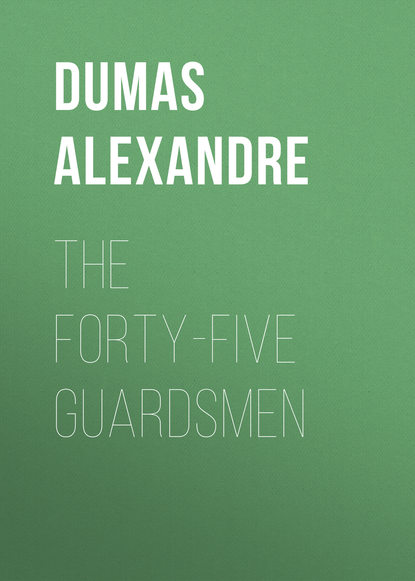По всем вопросам обращайтесь на: info@litportal.ru
(©) 2003-2024.
✖
The Forty-Five Guardsmen
Настройки чтения
Размер шрифта
Высота строк
Поля
"Ah! monsieur," said he, when he felt himself on the ground, "on the word of Jean Friard, you are a real Hercules; your name, monsieur? the name of my deliverer?"
"I am called Briquet – Robert Briquet, monsieur."
"You have saved me, M. Briquet – my wife will bless you. But apropos; mon Dieu! she will be stifled in this crowd. Ah! cursed Swiss, only good to crush people!"
As he spoke, he felt a heavy hand on his shoulder, and, looking round and seeing that it was a Swiss, he took to flight, followed by Miton. The other man laughed quietly, then turning to the Swiss, said:
"Are the Lorraines coming?"
"No."
"Then why do they close the door. I do not understand it."
"There is no need that you should," replied the Swiss, laughing at his own wit.
CHAPTER II.
WHAT PASSED OUTSIDE THE PORTE ST. ANTOINE
One of the groups was formed of a considerable number of citizens. They surrounded four or five of a martial appearance, whom the closing of the doors annoyed very much, as it seemed, for they cried with all their might, "The door! the door!"
Robert Briquet advanced toward this group, and began to cry also, "The door! the door!"
One of the cavaliers, charmed at this, turned toward him and said, "Is it not shameful, monsieur, that they should close the gates in open day, as though the Spaniards or the English were besieging Paris?"
Robert Briquet looked attentively at the speaker, who seemed to be about forty-five years of age, and the principal personage in the group. "Yes, monsieur," replied he, "you are right: but may I venture to ask what you think their motive is for these precautions?"
"Pardieu! the fear they have lest some one should eat their Salcede."
"Diable!" said a voice, "a sad meal."
Robert Briquet turned toward the speaker, whose voice had a strong Gascon accent, and saw a young man from twenty to twenty-five, resting his hand on the crupper of the horse of the first speaker. His head was bare; he had probably lost his hat in the melée.
"But as they say," replied Briquet, "that this Salcede belongs to M. de Guise – "
"Bah! they say that!"
"Then you do not believe it, monsieur?"
"Certainly not," replied the cavalier, "doubtless, if he had, the duke would not have let him be taken, or at all events would not have allowed him to have been carried from Brussels to Paris bound hand and foot, without even trying to rescue him."
"An attempt to rescue him," replied Briquet, "would have been very dangerous, because, whether it failed or succeeded, it would have been an avowal, on the duke's part, that he had conspired against the Duc d'Anjou."
"M. de Guise would not, I am sure, have been restrained by such considerations; therefore, as he has not defended Salcede, it is certain that he is not one of his men."
"Excuse me, monsieur, if I insist, but it is not I who invent, for it appears that Salcede has confessed."
"Where? before the judges?"
"No, monsieur; at the torture."
"They asserted that he did, but they do not repeat what he said."
"Excuse me again, monsieur, but they do."
"And what did he say?" cried the cavalier impatiently. "As you seem so well informed, what were his words?"
"I cannot certify that they were his words," replied Briquet, who seemed to take a pleasure in teazing the cavalier.
"Well, then, those they attribute to him."
"They assert that he has confessed that he conspired for M. de Guise."
"Against the king, of course?"
"No; against the Duc d'Anjou."
"If he confessed that – "
"Well?"
"Well, he is a poltroon!" said the cavalier, frowning.
"Ah! monsieur, the boot and the thumb-screw make a man confess many things."
"Alas! that is true, monsieur."
"Bah!" interrupted the Gascon, "the boot and the thumb-screw, nonsense: if Salcede confessed that, he was a knave, and his patron another."
"You speak loudly, monsieur," said the cavalier.
"I speak as I please; so much the worse for those who dislike it."
"More calmly," said a voice at once soft and imperative, of which Briquet vainly sought the owner.
The cavalier seemed to make an effort over himself, and then said quietly to the Gascon, "Do you know him of whom you speak?"
"Salcede?" – "Yes."
"Not in the least."
"And the Duc de Guise?"
"Still less."
"Well, then, Salcede is a brave man."
"So much the better: he will die bravely."

















